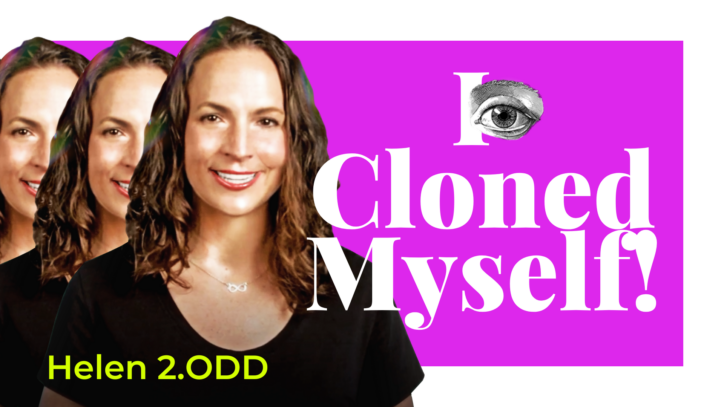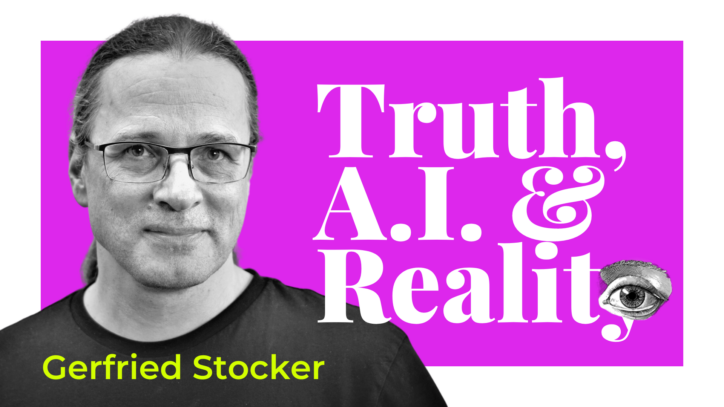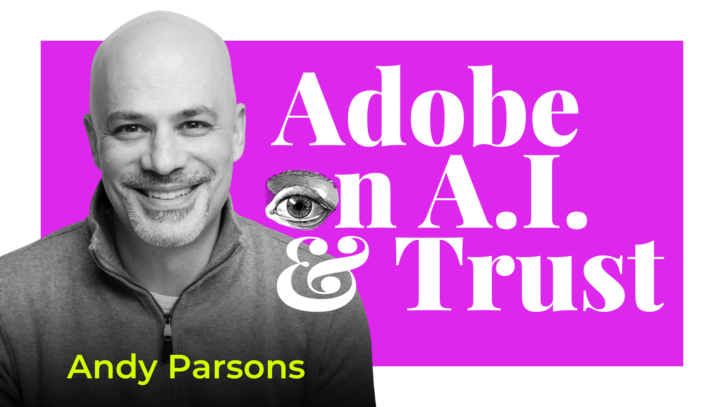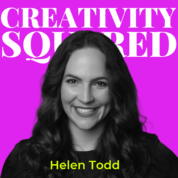
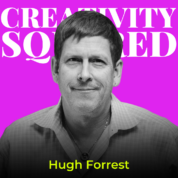
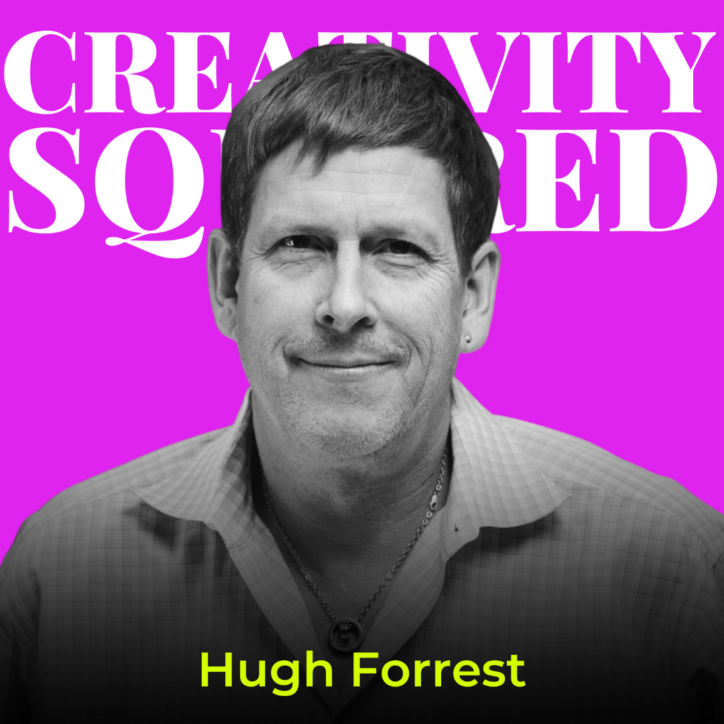
Ep17. A.I. Hype Cycle or Not? SXSW Co-President and Chief Programming Officer Hugh Forrest Discusses A.I., Tech Trends, and the Importance of Community
In Episode 17, we have Hugh Forrest who serves as Co-President and Chief Programming Officer for South by Southwest (SXSW) which includes SXSW Interactive, one of the largest tech conferences in the world helping creative people achieve their goals.
Founded in 1987 in Austin, Texas, SXSW is best known for its conference and festivals, for which Hugh oversees all of the content, that celebrate the convergence of tech, film, music, education, and culture.
Hugh holds many accolades, including “Austinite of the Year” in 2012 from the Austin Chamber of Commerce, and he was named one of the Austin Entrepreneurs of the Year in 2014 by Ernst & Young. Hugh was also awarded a Key to the City in January 2023 by Austin Mayor Steve Adler, and received an honorary doctorate in 2018 from Kenyon College, his alma mater. In 2021, he was awarded Diversity Champion of the Year by the Austin Black Business Journal. Through his decades of work with the Austin Reggae Festival, he has helped to raise more than $1 million in funding for the Central Texas Food Bank.
The next SXSW will take place March 8-16, 2024 in Austin, Texas.
In this conversation, you’ll hear Hugh’s unique perspective on trends at the intersection of tech, culture, and creativity, including lessons from the social media revolution for our current zeitgeist that encompasses all things artificial intelligence.
“A.I. can be a fantastic thing that can make our human experience all the more human, creative, and magical. Or it can be something that is significantly less. I hope that we learned the lessons of what we didn’t do in social media, and bring this to the A.I. world.”
Hugh Forrest
Discover what’s on the horizon for next year’s SXSW Interactive where A.I. will be all the buzz with over 250 speaker proposals submitted! The conference programming will also include sessions on virtual and augmented reality, quantum computing, the creator economy, synthetic biology, climate change, and more.
In this episode, Hugh considers whether A.I. is part of a hype cycle and discusses the need for guardrails on it. He also shares the importance and power of community in this moment in time.
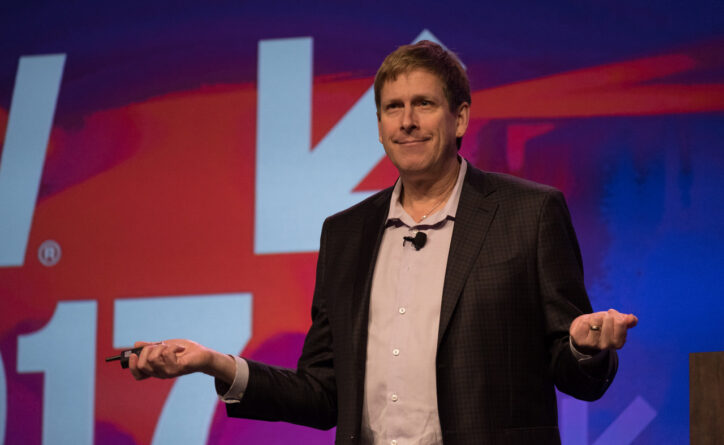
The Festival
SXSW wasn’t always the iconic cultural and technological event that it is today. When Hugh, a native of Austin, became the first paid employee of SXSW in the late 80’s (thanks to him being one of few people who owned a desktop computer at the time!), it was only a music festival.
“When [SXSW Founder, Roland Swenson] called me back in 1988 about using my computer, I never envisioned that this would be more than just a two-day gig. I never had any conception that we would grow this thing to the size and scale that it’s been fortunate enough to grow to.”
Hugh Forrest
They first started expanding the festival’s offerings by adding film showcases as well as multimedia in 1994. Yet, as technology’s relationship with art production grew ever closer, Hugh said he and his fellow organizers had a hard time bringing in an audience for the technology aspects of the festival.
At some point, Hugh says he and Roland doubted whether they could successfully bring the art and technology communities together in the way they envisioned – until Twitter came along.
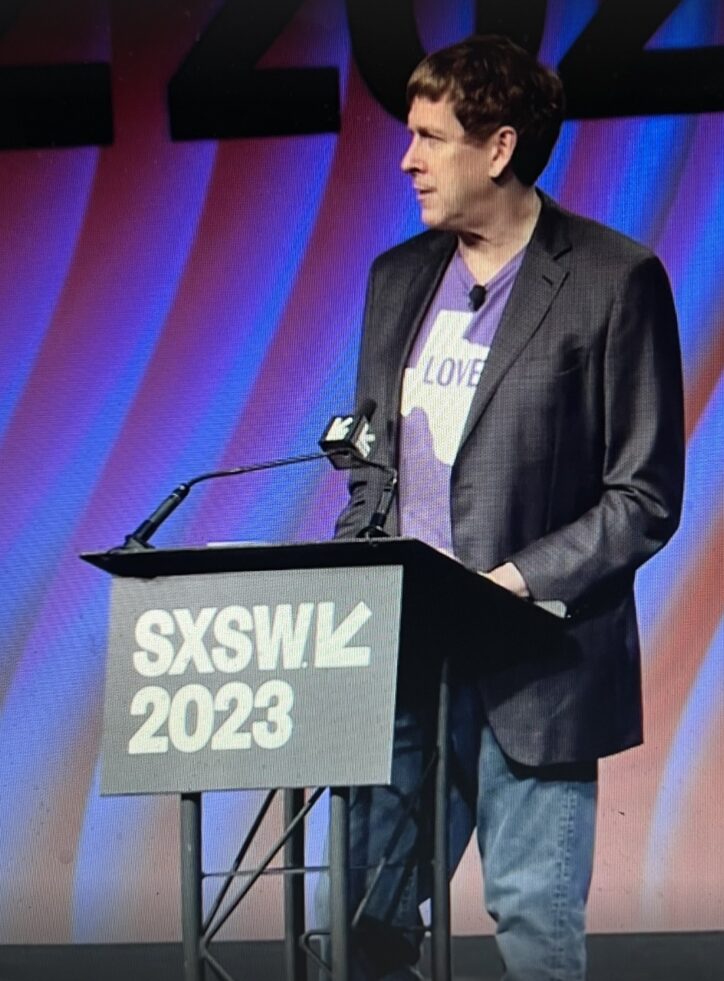
“Eventually, in the early or mid-2000s, we ended up being in the right place at the right time on social media, where a lot of the early pioneers in the space were at SXSW.”
Hugh Forrest
SXSW is where Twitter was able to generate the buzz it needed in 2007 to get its usership metrics off the ground. As the social media landscape continued to evolve, SXSW became a hotspot for startups looking to raise funding and venture capitalists looking for the next unicorn.
Fast forward to this year, when SXSW hosted over a quarter-million attendees in Austin over two weeks, featuring 1,500-2,000 panels and presentations, 300-400 film showings, and around 1,500 live performances from a global collection of bands.
Looking back, Hugh says it’s been “one hell of a ride.”
Looking forward, Hugh says that he wants SXSW to continue to be a place for the celebration of the two C’s: creativity and community. He says that fostering community at SXSW is increasingly on his mind, amid what sociologists have called “the great de-churching,” referring to the breakdown of traditional community-building institutions like churches, whose membership is in steep decline.
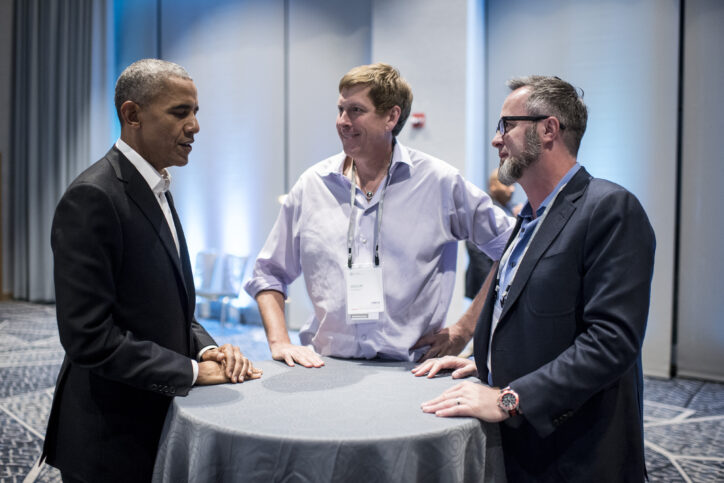
A.I., Tech Hype Cycles, and Responsible Adoption
Through his tenure at SXSW, Hugh has been in the front row to witness many of the greatest (and not-so-great) technological innovations of the modern age. Social media has certainly cemented its place in culture and the economy. The same can’t be said, though, for some of the other technologies that have taken center stage at the festival in recent years, such as cryptocurrency and the metaverse, among others. Meta seems more interested in developing A.I. right now than in developing the technology behind its new namesake. Similarly, 2022 saw the bubble burst for NFT’s and Bitcoin is trading around 60% lower from its all-time high in 2021.
Will the same be true for artificial intelligence? Hugh is hedging his bets, saying he’s been through so many hype cycles with SXSW that he still holds “some small amount of skepticism that this is just one more.”
Ultimately, though, Hugh thinks we’re in a different place with A.I. citing the real-world A.I. applications already in use, and the potential for the technology to change our collective future. Hugh believes that A.I. will outlast the hype generated by its relative newness, and one reason is how easy it is to understand.
However, Hugh acknowledges that there needs to be more forethought put into averting the worst outcomes of an A.I. Dilemma, rather than embracing the culture of “move fast and break things” that contributed to our current Social Dilemma.
“A lot of us really bought into this idea that social media was going to eliminate divisions in our society. And there have been a lot of really great things from social media. That said, there have been a lot of negative things that we did not fully anticipate when this age started.”
Hugh Forrest
Yet, he says there is cause for cautious optimism, especially from the European Union, which is working on their framework for regulating artificial intelligence. And, of course, those efforts are reflected at SXSW, with presentations from the likes of European Commissioner for Competition, Margrethe Vestager, who’s spent the last 10 years holding tech companies accountable for privacy violations and other social harms.
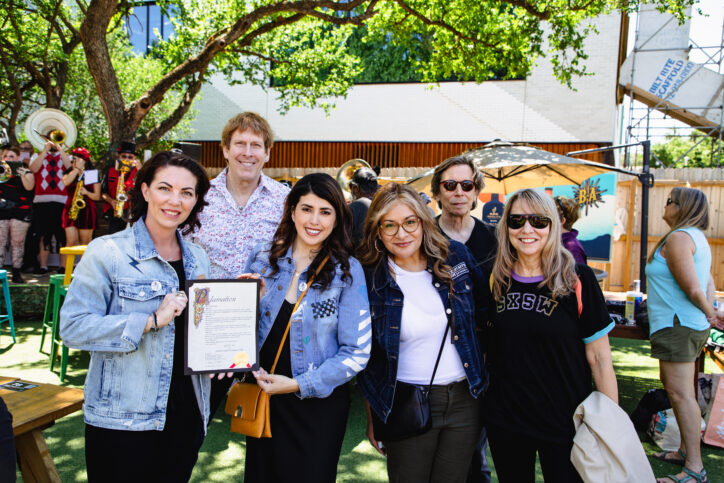
PanelPicker
We’re airing this episode right after the close of public voting for the speakers that will grace the stages at SXSW 2024. No surprise: A.I. is shaping up to be a central topic again next year, with over 250 presentation proposals directly focused on artificial intelligence. This year, A.I. is getting its own “track,” or standalone category, at the conference.
Beyond A.I., 2024 is looking like it will be a big year for SXSW in general. Hugh says that they haven’t received so many speaker proposals in more than five years. Some of the other big topics will include virtual and augmented reality, quantum computing, synthetic biology, transportation, climate change, and renewable energy. Alongside A.I., the creator economy will also be getting its own track in 2024 as well as a new fashion and beauty track.
Even though public voting is now closed, you can look through all the proposals under consideration for SXSW 2024 on the festival’s panel picker web interface (you’ll need to create a free account if you don’t have one).
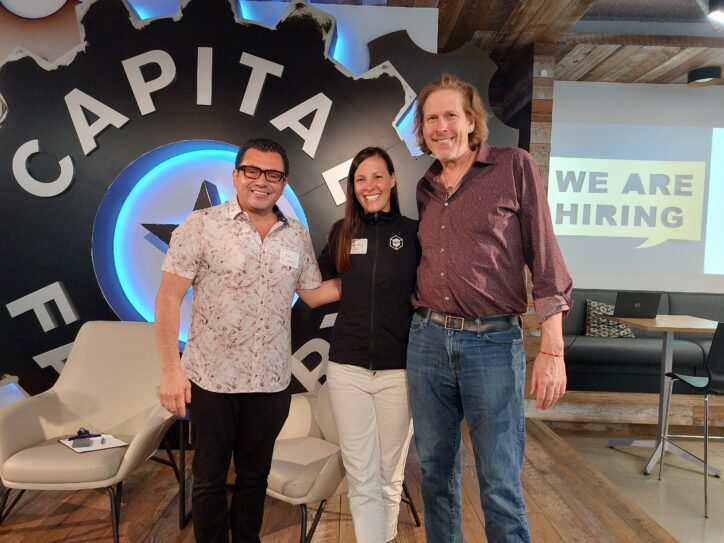
Creativity and Community
“One of the ironies of South by Southwest is that there’s a huge focus on Tech, but we always find that [new communication technologies] are not as powerful as face-to-face interactions, giving people a platform to connect with each other in person in real-time, and the power of that.”
Hugh Forrest
While the technology will get a lot of the buzz, Hugh says SXSW is just as much about the people as it’s ever been. As the community grows more diverse, more interconnected, more democratized, the value of the whole experience increases in tandem. Through the cycles of the newest tech hype, Hugh says that it will be hard for any one innovation to eclipse the simple power of gathering a bunch of smart, passionate, ambitious people at the same place and letting the magic flow.
Links Mentioned in this Podcast
- Connect with Hugh on LinkedIn
- Follow Hugh on Instagram
- Follow Hugh on Twitter
- SXSW’s Website
- Follow SXSW on Instagram
- The Atlantic “Why So Many Americans Have Stopped Going to Church”
- The Great Dechurching Book
- TheStreet “Mark Zukerberg Quietly Buries the Metaverse”
- Yahoo “NFT Sales Drop 83% In a Year”
- Creativity Squared The A.I. Dilemma Blog Post
- The Social Dilemma’s Website
- SXSW PanelPicker
Continue the Conversation
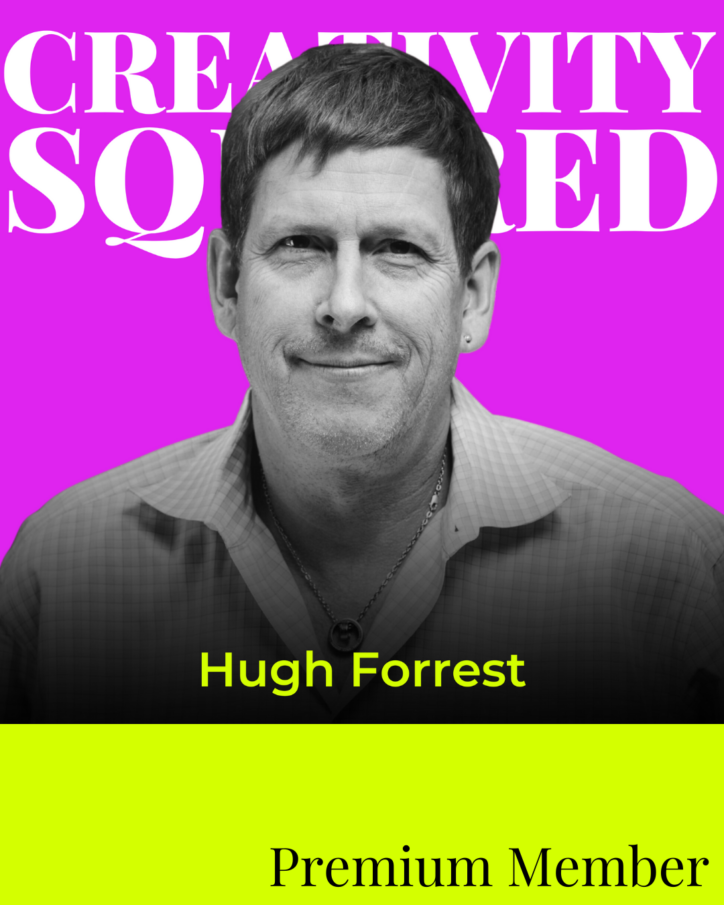
Thank you, Hugh, for being our guest on Creativity Squared.
This show is produced and made possible by the team at PLAY Audio Agency: https://playaudioagency.com.
Creativity Squared is brought to you by Sociality Squared, a social media agency who understands the magic of bringing people together around what they value and love: https://socialitysquared.com.
Because it’s important to support artists, 10% of all revenue Creativity Squared generates will go to ArtsWave, a nationally recognized non-profit that supports over 150 arts organizations, projects, and independent artists.
Join Creativity Squared’s free weekly newsletter and become a premium supporter here.
TRANSCRIPT
Hugh Forrest: South by Southwest 2022, by comparison, there was a ton of crypto stuff, crypto companies, activations, parties, networking events, crypto sessions, and we know that market has certainly cooled off since then. I think that we are in a different place with AI that this has, you know, long-term staying power and it is something that really is an inflection point we’re at now that will change our futures, our children’s futures, next generations.
But that said, having gone through many of these cycles at South by Southwest, I also, you know, have some small amount of skepticism. Is this just one more hype cycle? And so there you go. It’s hard to imagine at this point that AI is simply hype because we can see so many real world applications, not just frivolous applications.
It’s relatively easy for us to understand. So again, I think it’s, this is something that’s here to stay. That’s it.
We could come back and do this interview in two years and we can say, look how stupid we were to think that AI was gonna change everything. Now on to flying taxis, and that is the future.
Helen Todd: Hugh Forrest serves as co-president and chief programming Officer for South by Southwest, which includes South by Southwest Interactive, one of the largest tech conferences in the world, helping creative people achieve their goals.
Founded in 1987 in Austin, Texas, South by Southwest is best known for its conference and festivals for which Hugh oversees all of the content that celebrate the convergence of tech, film, music, education, and culture.
Hugh holds many accolades, including Austinite of the Year in 2012 from the Austin Chamber of Commerce, and he was named one of the Austin Entrepreneurs of the Year in 2014 by Ernst and Young.
Hugh was awarded a key to the city in January 2023 by Austin Mayor, Steve Adler. And received an honorary doctorate in 2018 from Kenyon College, his alma mater. In 2021, he was awarded Diversity Champion of the Year by the Austin Black Business Journal.
Through his decades of work with the Austin Reggae Festival, he has helped to raise more than a million in funding for the central Texas Food Bank.
As a longtime South by Southwest fan and attendee, who has also had the great honor to advise and speak there for many years, I’ve gotten to know Hugh and see all the hard work he and his team do to make the magic that is South by Southwest possible.
The next South by Southwest will take place March 8th through 16th in 2024 in Austin, Texas. Today you’ll hear Hugh’s unique perspective on trends at the intersection of tech, culture, and creativity, including lessons from the social media revolution for our current zeitgeist that encompasses all things artificial intelligence.
Discover what’s on the horizon for next year’s South by Southwest Interactive, where AI will be all the buzz with over 250 speaker proposals submitted. The conference programming will also include sessions on virtual and augmented reality, quantum computing, the creator economy, synthetic biology, climate change, and more.
In our conversation in this episode, Hugh considers whether AI is part of a hype cycle and discusses the need for guardrails on it. He also shares the importance and power of community in this moment in time. Enjoy.
Theme: But have you ever thought, what if this is all just a dream?
Helen Todd: Welcome to Creativity Squared. Discover how creatives are collaborating with artificial intelligence in your inbox, on YouTube, and on your preferred podcast platform. Hi, I’m Helen Todd, your host, and I’m so excited to have you join the weekly conversations I’m having with amazing pioneers in this space.
The intention of these conversations is to ignite our collective imagination at the intersection of AI and creativity to envision a world where artists thrive.
Helen Todd: Hugh, it is so nice to have you on the show. Welcome to Creativity Squared.
Hugh Forrest: Thanks, Helen. I’m really excited to be here and excited to have a fantastic conversation about creativity and about our journey at South by Southwest and what’s up the, what’s coming in 2024 and all kinds of cool things like that.
Helen Todd: Same here. I’ve been going to South by Southwest since 2009. It’s a big part of, I would say, my life to be honest, and especially the March journey down to Austin every year. But for those who may not know about South by Southwest, especially the interactive portion, I’d love to have you kind of introduce it.
And then also more really your origin story since you’re so tied to the beginnings of South by Southwest.
Hugh Forrest: Makes me sound so old Helen, which is not true. So South by Southwest is a festival of creativity, a celebration of creativity that happens every March in Austin, Texas. It started out as a music-only event way back in the dark ages of, dark pre-internet ages of 1987.
In 1994, we added film and what was then called multimedia to the mix. You know, since 1994, we’ve added a number of other verticals. Everything from health and medtech to food, fashion, style, government, social media, psychedelics, cannabis, sports. Pivoted a whole lot, but the bottom line and the North Star and aligns I think really well with the, your focus on this podcast is a massive focus on creative people in a city that has always cultivated creativity.
And that has always been a formula for something really, really compelling. And let me just add a little more context that when I say festival, we are essentially two things that are kind of mashed together. We’re by day, we are a conference with lots of panels and presentations.
And when I say lots, I mean like somewhere in the neighborhood of 1,500, 2,000 panels and presentations. By night, although also by day, we have a giant South by Southwest Film Festival, as well as a giant South by Southwest Music Festival.
The film festival will have, you know, 300, 400 different films. Everything from docs to narrative features, shorts, lots of really cool stuff, independent stuff, lots of, lots more mainstream stuff.
On the music side, we’ll have, you know, somewhere in the neighborhood of 1,500 bands from all over the US and all around the world, all different types of music. So again, this all flows into this massive, massive, massive celebration of creativity in all, its many, many, many different forms.
Helen Todd: Well, and, and one thing that I found fascinating is one of the reasons how you got hired for South by Southwest is because you had a computer and they didn’t. And to me, that’s kind of wild because it’s such a staple in, you know, the tech world, these days. So can you tell us a little about your origin story too?
Hugh Forrest: Yeah, Helen, as always, you’ve done your homework, so that’s a good thing. I grew up in Austin, was a big fan of the Austin music scene, you know, went to tons of shows back in the day. I went away to school in your neck of the woods. Kenyon College in beautiful Gambier, Ohio. Came back to Austin after that and wanted to start a newspaper.
And that was back when print was still a thing. That dates me. So I started a newspaper in 1986, I think, ‘85, ‘86. This was called the Austin Challenger. It seemed like a really good name for feisty young publication. It was an alternative publication. I always say it was less alternative because of its politics and more because of his publishing schedule.
We were supposed to be monthly and we never really were monthly. It was never really a money-making venture. It, I was doing other jobs to try to stay afloat and I was borrowing lots of money from my very generous dad to stay afloat.
And at one point he told me, or he suggested to me that, hey, there’s this new thing called desktop publishing, and I think you could save a lot of money if you embrace this because right now, one of your, your second biggest expense is typesetting. ‘Cause that’s what you did back in the day. And of course, being 22 years old and knowing everything about everything as most 22 years olds do, I said, well, that’s a great idea, but you don’t understand. We need this really expensive type setting because, you know, our readers will rebel if they don’t, if it’s not 300 dots per inches or something.
And then six months later went back to him and said, you had that idea of having a desktop publishing, that, that’s a pretty good idea. Let’s see if we can pursue that. So the whole idea, and you know, if you wanna go this way, I will buy you a Mac Plus and a laser writer.
And at that point, you know, Apple was really pushing to try to get into the education market. So he was a professor at UT, he could get these items at a fairly large discount. We went out and, and bought this stuff. I learned PageMaker 1.0 at that point or 2.0 and this did, you know, extend the life of this paper for another year.
The Challenger was kind of friendly rivals with another newspaper in Austin called the Austin Chronicle, and I say friendly because, you know, kind of covered some of the same things.
But the Chronicle had a huge staff. The Challenger didn’t really, was kind of me. The Chronicle was weekly. I was, you know, every six weeks at best. But I knew these folks, and they had, in 1987, they started this cool thing or this new thing called South by Southwest. And of course, since I was this feisty alternative publication I wrote, we wrote in The Challenger about how horrible South by Southwest was and all this stuff like that.
Anyway, I got a call from my current boss, Roland Swenson in I think March, 1988. And this was 10 days before the second event was supposed to begin. And he said, well, we’re wondering if we can put our database on a computer. And I said, well, you know, computers are good for a lot of things.
Databases are really good. And there was a little bit of a pregnant pause and he said, well, how about your computer? So, I, again, I came into the South by Southwest sphere because I had a computer, and they didn’t. Previous to my Mac Plus, they were doing all their databases on a huge, on an old typesetting machine, which, you know, is like this, basically a tank.
And having a Mac Plus made it a little bit easier. I remember we spent like three days straight typing names from this typesetting machine into this reflex program on Mac Plus. It kind of worked, it didn’t work. But anyway, somehow I impressed Roland enough that I was then eventually became the first paid employee at South by Southwest.
And again, as you said, and long story made short, I got hired because I had a computer and they didn’t. It’s always funny to tell that story on many levels, not the least of which is that, you know, it was a Mac Plus, which is like, you know, that much of our current smartphones.
And then roughly five, six years later when South by Southwest decided to add film and quote multimedia to the mix, Roland said, well, you’ve gotta, you have the computer. I guess you understand technology. Why don’t you help manage this multimedia thing? And that was, you know, the biggest misjudgment in the history of misjudgments, and then I can barely turn on a computer.
But sure, that sounds like a fun thing to do. So, when we launched this or added this multimedia thing to South by Southwest at that point, cutting-edge technology, I mean, we were, it was, yes, the internet was out there, but it really wasn’t a mainstream slash commercial thing at that point. So really, the first first couple years we were focusing a lot on the power of CD-ROMs and hence the idea of multimedia.
We changed the name from multimedia to interactive late nineties. That seemed more in line with where this medium was going as well as this Internet thing that was beginning to blow up. That said, we had a really hard time finding our audience on the interactive side of the fence.
On the music side of the fence, this South by Southwest immediately resonated with the music industry, with musicians, with people in Austin, people in Texas who are music fans. On the tech side, it just, we really had a difficult time.
And oh, you know, there was kind of a joke, but always like, look, they’re the cool kids, musicians on that side of the room; they’re the tech folks on this side of the room, and they are oil and water. They do not mix, you know, why are we doing this? We’re trying to put chocolate and peanut butter together. They don’t mix. It’s not the right way to go.
And Roland would always say to me, well, just, you know, let’s try it one more year. Maybe it works and if not, well, we’ll revamp this. But eventually, in the early 2000s or mid-2000s, we ended up being in the right place the right time on social media where a lot of the early pioneers and early visionaries or idea makers in this social media space were at South by Southwest.
And, you know, it’s hard to remember now or think about now when social media is so much a part of so many of our lives. Or maybe we’re withdrawing from that a little bit, but we understand what it was. But early in 2000s, people didn’t really, you know, social media was a new thing. There was a learning curve here, and we were a place that a lot of people, South by Southwest was a place that a lot of people came to, to learn about social media, particularly from the people who are really envisioning it.
So this focus on social media is one of the things that really pushed the growth of this interactive event as well as pushed the growth of South by Southwest and certainly somewhat of a turning point or watershed moment for us was 2007 when Twitter, what we now know and love as X essentially launched at South by Southwest.
I say essentially because they really didn’t launch at South by Southwest. They had been out for a while, but they had a big presence at the 2007 event and they had a relative to their size at the time, they had a huge spike in usership, and so they were always very kind to credit South by Southwest as the place they launched.
After that happened, you know, really every startup in the world wanted to come to South by Southwest to get that same kind of bump. Every VC in the world wanted to come to South by Southwest to discover the next Twitter, and we really began pushing or growing more as a technology event as opposed to a music event.
Again, those are those, that’s kind of a big picture view of this stuff. Around that time we also again began to mix in these other verticals that attracted creative professionals. And that again, proved to be a neat mix. So that is a much longer than elevator pitch recounting of my origin story at South by Southwest.
And, and let me just put an end to that by saying, you know, it’s been a heck of a journey. It’s been a heck of a ride when I, when Roland called me in back in 1988 about using my computer, I never envisioned that this would be a, you know, more than a just a two-day gig or something.
I never had any conception that, that,we would grow this thing to the size and scale that we have been fortunate enough, or it’s been fortunate enough to grow to. So again, it’s been a hell of a ride.
Helen Todd: Yeah, and it’s amazing to me just how quickly the technology has changed in your tenure of, for me, started at South by Southwest with one computer and that was so cutting edge. And now you go and, you know, I think one of the favorite presentations is always Amy Webb, who’s a brilliant futurist talking about everything that’s coming from quantum computing onwards.
And it just keeps on speeding up so fast. But one thing that you said about the, the change from the interactive to the music. I remember some of my first early memories of South by Southwest ’cause a few years I stayed for the full week, which is a lot energetically to do interactive and go to music.
And on Wednesday it’s kind of like this transition day and it went from like, total tech nerds, like with multiple phones, everyone’s around the plugs with computers working, and there’s like this visceral change of like all the tech nerds leaving and then all these cool musicians from all different types of genre from like hip hop, country, grunge, whatever, which showcased.
And it was like such a visceral change in the demographics of, but I feel like now it’s a little bit more blended of the conferences together.
Hugh Forrest: Yeah, I absolutely, that was the experience for so many years. But I also agree that it’s a little more blended now and a lot of reasons for that, but not the least of which is that, you know, like it or not, for better, for worse. There’s a tech backbone to everything now, certainly a tech backbone to music.
And certainly one of the skills that we try to teach musicians coming to South by Southwest particularly up and coming young musicians is, you know, how to manage your own social media presence, how to manage your website, how to manage TikTok or, or whatever the kids are using at this point.
So, so again, it is a little more blended now, but yes, you are very much correct that, you know, it goes from kind of skinny tech jeans to really skinny rock and roll jeans, you know, kind of cool tech tattoos to, you know, full on sleeves, legs, faces, whatever, tattoos for the musicians.
Helen Todd: Well, and,one thing that I love talking to you about too, just ’cause the seat that you sit in, are the trends that we’re seeing. And it does seem like every year, whether it was back in 2007, which was before I started going, like all the hot buzz was Twitter and then, you know, different years, there’s a hot new buzzword.
This past year was definitely artificial intelligence. But can you kind of tell us some of the trends that you’re kind of seeing right now in this moment in time?
Hugh Forrest: Yeah, definitely 2023, the March 2023 event, AI was a huge focus then. I mean, we were only at that point, three months from the release of ChatGPT in early December or late November.
I think that that will probably remain the most prevalent trend at South by Southwest 2024. AI, all its implications, all the many consequences we need to think of and particularly in the, in light of our, you know, our ongoing North Star is, you know, how does AI change, impact, redefine creativity?
It does, and I think we’re all, we’re all coming to grips with that. Does it mean you just become more creative or most creative in the terms of the prompts that you type in? Does it, you know, does it mean that you learn what it, what various AI programs do well and that that can free you up to simply be more creative?
Again, we’re all learning this, and I think South by Southwest is a great place to explore this. We’ll also have plenty or lots and lots of discussions at South by Southwest 2024 about, you know, this ongoing issue of how to put guiderails on this, guardrails on AI to try to, to get to a better place on this and not have the kinds of negative consequences we’ve seen with other technologies, social media.
But beyond, AI, some of the things that I think we’ll see at 2024, South by Southwest 2024, you know, we’ll see, we’ll continue to do coverage on the metaverse, XR, AR.
I think this will be, I mean, it’s not, that’s certainly not gonna be as big as AI, but I think it will be compelling because the new Apple headset’s gonna be released sometime in the spring. We don’t, my understanding, we don’t know that could be anywhere from January to April.
But that is, you know, there’s, you can make an argument that that will really reignite interest in this space, will encourage a lot of people to get into this space that haven’t before.
Helen Todd: Hugh, I’m gonna make a bold prediction that they’re going to time it before South by Southwest.
One thing that OpenAI I feel like they missed by a day, is that they actually released ChatGPT4 like the Tuesday after interactive, or like the day after Greg Brockman was on stage, like it was one or two days too late of South by Southwest. And I feel like they should have done it right before Interactive started to like really maximize the buzz.
So that’s my bold prediction that they’re gonna do it before South by Southwest Interactive.
Hugh Forrest: Well, Tim Cook, who I know is an avid subscriber to your podcast, you know, you can contact me about how we can make a big splash with that release at South by Southwest. So there you go.
You know, I think we’ll also see some content on quantum, quantum computing: the possibilities, the potentials, the pitfalls there.
I think we’re still a little bit a ways away from that really becoming something functional. But, you know, South by Southwest should be about what’s in the medium term or long-term future. So again, we’ll see some content on that.
Certainly continue to push on synthetic bio and what’s happening there.
You mentioned Amy Webb before, that’s certainly been a big focus of a lot of her research. You know, additionally we’ll have lots of content on all kinds of developments in the music and film and TV industry.
One presumes that the strike that we’re seeing as we record this on August 3rd will be long over by then. But I think that, you know, the bigger picture of the strike is that Hollywood, as with every other creative industry is wrestling with these with how these new technologies, ie AI impacts their future.
Certainly we’ll see a lot more or continue to see a lot more content on transportation innovation. See a lot of content on climate change and particularly potential solutions or ways to mitigate climate change. We will continue with the energy track that we introduced in 2023, which specifically focuses on, you know, renewables, alternative energy.
A lot of food stuff, which in many ways flows into that climate change content. More sports, more style. Again, it is a great place to meet, connect, learn from, be inspired by very, very creative people from very, very different industries.
And back to your, kind of the initial focus on this is that we’ve always had the belief that you can learn a lot from very creative people in the industry that you work in, period. You can also learn a lot and often even more from very, very creative people in other industries and learn from their creative process, their work process, the way they approach and overcome problems.
And that’s, again, always been our general formula for success, is mixing creative people from various different industries, letting them be, learn, be inspired by each other, watching the new opportunities come out of the event. And just being a convener and a platform where so many creative people can share ideas.
And that’s a huge honor. And it’s what makes South by Southwest special.
Helen Todd: And one thing that I really love about South by Southwest too is it’s such an ideas-forward conference. I’ve got to have the amazing privilege and honor of speaking, I don’t know, four or five times now.
And, you know, even though Tim Cook is, and this podcast is so famous and Tim Cook is a listener that I get to be on stage at the same time. There was one year I almost wanted to skip my own session because the Game of Thrones cast was on another stage. But to be able to really surface the ideas that are very cutting edge at the time, alongside the people making the tools and, you know, maybe bigger names in the tech world. So I love that.
Hugh Forrest: I think you’re actually burying the lead on that one. Helen, Game of Thrones was on one stage at the same time you were speaking and some guy who you may have heard of before named Joseph Bee-den or something. Oh, it’s Joe Biden was on the other stage at the same time.
Helen Todd: That is very true.
Hugh Forrest: We’ve got a great photo of Game of Thrones folks with Joe Biden backstage, and you can make all kinds of like, you know, punchline captions the current state of politics, right.
Helen Todd: That’s funny. I’ll have to find that photo. Well, and one thing too that you mentioned, you know, like, what was it, probably 2022, like the hot buzzword was all the metaverse, and now that’s kind of a little bit crickets, but it’s still around and still part of the programming for or was part of 2023 and will be about 2024. But, I mean, what is your sense…?
Hugh Forrest: I think that, you know, in part because of 15 years ago with Twitter, but just in part of how the world works at this point, South by Southwest has become front and center on a lot of these new technology hype cycles.
So were we doing this interview a year ago, and you asked me what’s gonna be the biggest trend at South by Southwest 2023? I would’ve said Metaverse. We had just done our speaking proposal process and we had scores and scores and scores of speaking proposals about the metaverse. You know, Facebook slash Meta was putting, pouring millions and billions of dollars into this.
That market has certainly cooled in the 12 months since then. It’s not gone away. It’s gonna come, it will happen in one form or another. And I think the most accurate way is to describe it as the metaverses. ‘Cause I don’t think there’s gonna be one thing.
2021 or, so that’s, excuse me, 2020 South by Southwest 2022, by comparison, you know, was, there was a ton of crypto stuff at the 2022 event. Crypto companies doing activations, parties, networking events, crypto sessions. And we know that market has certainly cooled off since then.
I think that we are in a different place with AI that this, has, you know, long-term staying power and it is something that really is an inflection point we’re at now, that that will change our futures, our children’s futures, next generations.
But that said, having gone through many of these cycles at South by Southwest, I also, you know, have some small amount of skepticism. Is this just one more hype cycle? And so there you go.
It’s hard to imagine at this point that AI is simply hype because we can see so many real world applications, not just frivolous applications.
It’s relatively easy for us to understand. So again, I think it’s a, this is something that’s here to stay. That said, we could come back and do this interview in two years and we could say, look how stupid we were to think that AI was gonna change everything. We’re now on to flying taxis and that is the future.
Helen Todd: Yeah, I saw on Instagram the other day, that flying cars are, is a real thing now too, so
Hugh Forrest: Of course they are, why wouldn’t they be?
Helen Todd: Everything’s just moving so fast. Yeah, well, I remember leaving March, or leaving Austin in March and like having that question of, you know, is AI this disruptive or is it just the hype cycle? Because when you hear Amy Webb talk, you know, I love her, her setup of like, it’s a little binary in terms of, we can go one way or teeter another, which is a lot more dystopian and whatnot.
And then you have tech ethicists like Tristan Harris, who has the AI dilemma out, which we’ll be sure to include in the show notes. That’s really, I loved his setup. He’s like, pretend that we’re from the future coming to today, saying like, now’s the time to change and we didn’t have this opportunity at the onset of social media, which for better or for worse, you know, social media, but we love and hate at the same time in a lot of ways.
So I, I still have this like internal like, and then you hear like Scott Galloway’s, like he doesn’t think it’s as big of a deal as the gravity of the situation of AI. So it, I think it depends on who you talk to and who you listen to, what the, you know, what they’re saying. So, yeah, do you have any other thoughts aside from the hype cycle about AI in this moment in time?
Hugh Forrest: Well, I do think that, or I agree that with your perspective that, look, we have been through this with social media before. And when I say we, again, South by Southwest was really for better or for worse, right in the center of this.
And, we at the dawn of the social media age, a lot of us really bought into this idea that social media was going to absolutely make us closer. It was gonna make the world a better place. It was gonna eliminate these divisions in our society. And, you know, there’ve been a lot of really great things that have come out of social media.
That said, there’ve also, we all can, I think, fairly admit that there have been a lot of negative things that have come out of social media that we did not fully contemplate, anticipate, think about, when this age started.
There were some that were doing this, people like Jaron Lanier who were, you know, raising flags from, from day one, or caution flags from day one. But again, I think that, we have got to learn from that experience, and be more mindful, be more cognizant, be more aggressive in terms of putting safeguards, guardrails, guiderails, regulations, laws around the, this emerging industry of AI.
It is, on the one hand it’s, there is some comfort in seeing what some of the efforts that are being made now. As we taped this two weeks ago, the seven companies were at the White House, seven tech companies at the White House signing a, you know, some kind of pledge that they were gonna regulate themselves.
I think we’re all a little bit skeptical of this, but, you know, these are some steps that at least are, seem in the right direction and seem like they’re more than what we had at social media.
So very, very cautiously optimistic that we’ve learned something here.
Helen Todd: Yeah, well, I’ll be really curious to see the sessions and all the discussions in March and see what’s changed because goodness, at the speed that everything’s moving, I think if we have this conversation in just two months, it will be different than where we have it today.
But as I probably say, almost on every episode, I’m very pro-regulation or maybe even watch dogs, our third party watchdogs. ‘Cause we don’t really, I think, have adequate third party watchdogs or regulations for social media yet. So hopefully these talks do offer some hope that it’s coming.
Hugh Forrest: Your phrase in watchdogs is good. I think also, you know, what is different now that you can, is tangible is, the push for regulation, watchdogs, however you wanna phrase it, of tech companies from our friends in Europe. And that is, you know, that push is slowly making its way across the Atlantic.
And, you know, I mean we’ve had a huge presence from the EU at South by Southwest over the last probably decade. One of the, the loudest, strongest, most passionate voices there, Margrethe Vestager has spoken at South by Southwest many times about our need for this, so, or the needs we have here.
So again, I think there is cautious optimism that we’ve learned something that we can create scenarios that allow tech companies, startups to innovate, but don’t give them carte blanche to move fast and break things, as was the ethos 15 years ago.
Helen Todd: Well, since the show is about AI and creativity and we, you know, explore the full spectrum, including the guardrails and all of that, but also the fun and there’s so much creativity, which you mentioned at South by Southwest and I know AI is a big part of that now as well.
So what are some of the different ways that people can experience art and technology at South by Southwest?
Hugh Forrest: Well, many. Art in the big picture of art. You know, we, again, have this huge music festival. We have a huge film festival. And the way that the badges are set up, we certainly encourage cross polarization there.
We have had a South by Southwest art program for several years that will be on hiatus for 2024, hoping it comes back in 2025. That said, I think we’ll see a lot of activations that showcase traditional artwork as well as less traditional artwork that utilizes AI or VR, AR holograms.
We’ve done, you know, pushing back to that VR idea, and we talked about it previously on the Apple headset and our friend Tim Cook, we’ve had a,virtual reality theater at South by Southwest for the last several years. It’s a kind of a hands-on play space where people can experience some really cool immersive content and experiences.
And that has been very, very popular with our attendees. And again, I think that we maybe on a bit of a renaissance with the AR VR space. Given that Apple is pushing into this market more, and Apple is generally pretty smart about what markets it gets into and understanding when the market is mature enough to, for them to make their entree.
So again, I mean, what what we, what is so much the core of South by Southwest is providing experiences that showcase creativity, art in all its many forms and giving inspiration to our community that way.
Helen Todd: Yeah, I know that seeing some of the different activations is always a treat. It was a couple years ago, it was pre-pandemic, but there was, in the VR theater, like a NASA experience where for those who will never be able to go to the moon or I think it was Mars, Mars, it was so cool. I remember like jumping and then looking down and there were footprints in the VR headset from my jump.
So it was totally immersive and all of like, the latest tech and all the different experiences were all right there just to sample.
Which makes me think, ’cause you, you know, you get access to all of this every year, is there any like standout experiences that have really taken you aback of like, oh, wow? Or as the, you know, programmer, you can’t pick out any favorites. I respect that too.
Hugh Forrest: No, it’s less of that and it’s more that I’m, I tend to experience more of the event from my computer of, you know, dealing with whatever minor fires or issues or challenges there are. And I tend to learn more about the event from talking to people like yourself who are out there in the field and hearing the positive experiences they have.
I mean, certainly, that said, okay, that framework established, I mean, probably two of the neatest things in the last 10 years. 2017, the TV show, Westworld, they did this huge immersive experience, immersive or IRL immersive, where they took over a town 20 miles from Austin and they bussed a very, very small amount of South by Southwest attendees.
And they were actually in Westworld. They’d hired actors to be Westworld characters. I did not get to go to that, but
Helen Todd: I didn’t either, but I heard about it.
Hugh Forrest: Yeah, we heard lots of great stories about it and wow, that’s really cool. A year earlier, we were fortunate enough, blessed enough, however you wanna phrase that, to host 44. That would be Barack Obama at South by Southwest as well as Michelle Obama. They were two different keynotes.
I got to meet both of these individuals briefly before their, before they went on stage. And those were certainly experiences that I’ll cherish forever and ever. And, you know, was, again, huge honor that we were able to host the president or the host leader of the free world, to talk about his vision of creativity at an event that he really felt, you know, was the epitome of creativity.
And that was the very much the focus of his talk. Michelle Obama, FLOTUS, talked about her efforts to empower women and young girls. And that’s certainly a huge theme at South by Southwest as well is how we can push the DEI conversation, how we can elevate communities that have been traditionally marginalized.
So her presence was equally powerful. And again, those were, if you’re asking me one of my favorite memories of x number of years working here, there you go.
Helen Todd: That’s amazing. I was lucky enough to be in the audience for the Barack Obama one. It was kind of nosebleed seats, but it was, I still remember some of the things that he said at that talk so well too. So that’s neat.
Well, one question I have because having spoken, attended and been an advisor for many years for South by Southwest, one of the processes, ’cause you know, you do so much footage of the festival and then share it online, which is great. So all, a lot of these talks, if not all of them, at least the main keynotes are available for watching online, which is always so fantastic.
And within the panel picker, which I know we’ll talk about in a second, but, it comes with lots of waivers to sign that you’re signing over, you know, giving permission to South by Southwest and then also how you’re not using it, you know, the logo and stuff outside of certain ways.
So I know like from that standpoint, there’s a lot of waivers and, you know, brand usage that South by protects, understandably so.
And at the same time today as as of the recording, I’m introducing my custom synthetic avatar to the world. So I’ve been cloned digitally and cloning my voice and I’ve often thought about waivers are totally, every waiver today is totally out of date because when you sign over, yes, you can use my likeness in film and video and whatever technology is going to come in the future in all of the universe and world or you know, whatever legalese way they say that, is now literally giving our people are signing away, you know, to have their voice cloned and their likeness animated in ways that, you know, we probably couldn’t have even imagined when these waivers started in the center of a conference of all of this tech that also deals with a lot of media. I’m curious if internally in the internal South by Southwest staff conversations if this topic has come up already or not.
Hugh Forrest: Yes, it has come up already. Thankfully we have a few very, very capable lawyers who understand this stuff a lot better than I do. But I, you know, bigger picture, it fits into what so many of the, our current conversations are. And so much of what we’ve touched on in this podcast is just how AI changes or potentially changes everything.
And just when you think you’ve kind of covered all the spectrum of ways this can, impacts our near term future. Like, you open another door and Oh wow. That’s going to change things too. So you’re, I think you’re exactly right on this, that it will change dramatically change how we, how South by Southwest and other events, you know, the fair rights usage of video recordings, of audio recordings that we make of our content and brave new world ahead, right?
Helen Todd: For sure. And speaking of the future, well I guess before we do predictions and stuff, looking just to March 2024, can you tell us what it’s in store? You kind of teased a couple of tracks, but is there anything that you want our listeners and viewers to know about March, March’s South by Southwest?
Hugh Forrest: Well, a lot of the stuff that we’ve talked about, yes, you know, a story that will surprise no one, we’ve had a artificial intelligence track for 2024.
You know, again, it’s front and center with so much of the, what our community is focused on. We will also have a new creator economy track. Certainly creative economy has been around for a while, but we think that this makes particular sense of South by Southwest because we have the music and film elements and that this kind of bridges these many different aspects.
We’ll have a fashion and beauty track this year. We’ve done a lot of content on that in the past, but this year, there’ll be a full on track on that. Additionally, things that we’ve done in the last few years that will remain strong for 2024, I mentioned it before, transportation track.
Last year we had a track on psychedelics. That will continue in 2024 with the context there being that more and more states are changing laws on psychedelics. More and more medical professionals are open to the kind of benefits of psychedelic experiences, and there are more and more entrepreneurial opportunities in this space. And we are certainly always focused on entrepreneurial opportunities at South by Southwest.
So again, I mean it is a celebration of ideas. There is tons of different content. The principle, the unifying concept that ties all this content together is again, people who are thinking in massively creative ways, thinking about tomorrow, thinking about five years down the line. And a great way to inspire that and that creative thinking and everyone who attends.
Helen Todd: Thank you for that preview. Well, and one of the things that you and I both love is panel picker and for those who aren’t familiar with how the selection process, ’cause I think it’s actually a very innovative way that you all select the sessions that take place at South By.
And maybe share the quantity that you get, and I’m curious kind of how many submissions you’ve gotten for AI, and then also, you know, why you love panel picker, because I know I go back to it too.
Hugh Forrest: Well, this is some, this is an interface that we’ve used for roughly 15 years at South by Southwest, something that we built back around 2007, 2008.
And the idea was that we have a strong, strong focus on community at South by Southwest. Community or creativity and community are the two Cs that really define us, and that often the community has better ideas on content than we the organizers have. Often they know the experts in these spaces that we don’t yet know.
So we created a interface where anyone in the community could enter speaking proposals. And those proposals are collected, then displayed on a voting application where again, the community, anyone who can get online can vote on what they, which ideas they think are best. It’s simple, up down, internet style voting.
This interface serves us very well on a lot of different levels. It creates engagement in the summer when typically we didn’t have a whole lot of engagement at South by Southwest. It also helps us understand what our, what the community is really thinking about. So, you know, what the community is thinking about in August, 2023, again, is the very much the theme of this conversation: AI.
We got, you know, somewhere in the neighborhood of 250 proposals that have a direct focus on, on AI, but we’ll also see other blips in there. And, you know, in previous years, we would see, like, you know, the previous year there was two proposals on voice bots.
Then this year there are 30 proposals on voice bots. Oh, wow. This, our community’s interested in this. Overall, we had more, speaking proposals this year, then I think back to 2018, 2017. So definitely most since the pandemic.
Helen Todd: Oh, that’s great.
Hugh Forrest: I think that reflects overall interest and buzz in South by Southwest.
I think that when this podcast airs, the voting process, the community voting process will have concluded that concludes on August 20th. Nonetheless, the interface will remain live at panelpicker.sxsw.com. That’s panelpicker.sxsw.com and encourage your viewers, your listeners, to go in and play with the interface.
It is again a great way to understand what very creative people think are thinking about. There’s a search functionality and you can type in whatever your favorite keyword is and see what kinds of speaking proposals are in this interface, some of which will be, well, that makes sense. Some of was really, I don’t agree with that at all.
But it’s, again, a marketplace of ideas, which is very much what we are at South by Southwest. So something to, to play with, and in the vernacular, geek out on.
Helen Todd: Well, and I’ll be sure to put the link in the description. And I think the other aspect too that’s really nice is that you have the community vote, then you have an advisory board, and then the staff picks. And one of the mechanisms for the advisory board is, you know, if there’s really great ideas that might not have the, maybe volume of votes, but to surface those kind of like hidden gems from different subject matter experts in addition to the vote.
So I really just love the, the, the whole process of how the sessions are decided too.
Hugh Forrest: Well, thank you for the nice words. That means a lot. While the process is definitely not perfect, we think that it again, re re reinforces that community aspect of South by Southwest in terms of the overall judging, grading, rating, you know, we wanted to have something that the community could engage with, but we also wanted to ensure that it wasn’t simply a popularity contest that someone who had 10 million followers on the platform formerly known as Twitter, would not have an advantage over someone who had 10 followers.
And hence the, we have this advisory board or panel picker evaluators who look at this, look at every, or a set of ideas. We have staff who look at this set of ideas, and we try to be as aggressive and diligent there to find the things that aren’t hidden gems, find the things that are obvious that, wow, this is an amazing idea, there’s, this is perfect as well as, as you say, find the hidden gems that haven’t gotten a whole lot of attention, maybe from the public voting, but wow, there’s some, some real meat here.
This is a completely different take on AI, but it’s really valuable. This is a speaker from, you know, Kenya, and that’s exactly the kind of perspective we should have in Austin in March. Full speed ahead here, right.
Helen Todd: Yeah. I love it. Well, and one of the things that you mentioned about community, which is so core to South by Southwest, but one of the things, as we were talking before the official recording of the episode is that you mentioned a book, the Great Dechurching, and I was hoping that you could share a little bit more with our viewers and listeners, kind about that and how you’re thinking about community in this moment in time.
Hugh Forrest: Yeah. I had seen a story on this essay on this book, or a view on this book in the Atlantic in July. The book is scheduled to come out August 22nd, so I think that’s, it will be out when the podcast airs. It is a study on the decline in church attendance in the US and the authors contend that in the last 20 years, the decline has been steeper than ever before.
And talk about the factors there, one of which is that we’re just, or one of the big factors there is, is as a society, we are less focused on community and more focused on individuals than we ever have been before. I find this fascinating because again, I think one of the things that, one of the big things that we do, that we serve, that we are very attentive to at South by Southwest, is providing a sense of community.
I’ve given a few talks over the years, lectures, presentations, however you wanna phrase it, about how events like South by Southwest, TED, Burning Man, on down, lectures at the Y, you know, and those are great too, provide, to a degree, the kind of community that the church typically or traditionally did in America and in other countries.
So, again, I’m fascinated by this book. I hope to have some time to read it and understand a little more about what they found and perhaps apply some of their, the author’s learnings to what we do at South by Southwest. But, you know, again, one of the ironies of South by Southwest is that there’s a huge focus on tech and a huge focus on, you know, whatever new platform there is that allows people to theoretically come together with this.
Twitter, X, you know, MySpace, Facebook, Meta, TikTok, Be Real, you know, whatever comes out between now and then. But what, what we always find is that, you know, that is still not as powerful as face-to-face interactions, about bringing, to get people together one place, one time, giving them some kind of common experience, giving them a platform to connect with each other in person in real time and the power of that.
And, you know, it’s possible that sometime in the future we create platforms, technological platforms that do that, but haven’t yet, you know, and events, conferences, conventions, festivals, I think are doing a lot more of that now. And in some ways fulfilling that role that other institutions such as the church have traditionally provided.
Helen Todd: Oh, I know I’ve made some dear, dear friends from South by Southwest over the years and can attest to the power of the community. Well, for final thoughts for the episode,,do you have any hopes, predictions, wishes when it comes to tech or AI and tech,at this moment in time?
Hugh Forrest: You know, I will reiterate what we talked about earlier that, I hope we can embrace this age of AI, which seems like we’re on the cusp of this. We’ve entered into this with both enthusiasm and caution, with excitement and skepticism with an eye towards innovation as well as an eye towards appropriate regulation.
This can be a fantastic thing that can make our human experience all the more human, all the more creative, all the more magical, or it can be something that is significantly less. And so I certainly again hope that we learn the lessons of what we didn’t do in social media and bring this to the AI world and, you know, create a future that’s much more dynamic in many ways and celebrates the power of community, the power of community, the power of humanity, as opposed to denigrating that, which unfortunately we saw some of with the social media age.
Helen Todd: I definitely share everything what you said and you said it so beautifully. So, Hugh, I feel like we can keep talking. We didn’t even really scratch the surface of all of our book sharing notes, so we’ll have to get you on the show down the line.
But thank you so much for sharing so much of your time with us and your thoughts on all things tech trends, AI, and South by Southwest today. So thank you so much.
Hugh Forrest: Thanks Helen. It’s been an honor to be on the show and thanks for being such a huge part of the South by Southwest community since that first time you attended in 2009.
Helen Todd: I will definitely be back in March and we’ll see you in Austin then.
Hugh Forrest: Absolutely.
Helen Todd: Thank you for spending some time with us today. We’re just getting started and would love your support. Subscribe to Creativity Squared on your preferred podcast platform and leave a review. It really helps and I’d love to hear your feedback. What topics are you thinking about and want to dive into more?
I invite you to visit creativitysquared.com to let me know. And while you’re there, be sure to sign up for our free weekly newsletter so you can easily stay on top of all the latest news at the intersection of AI and creativity.
Because it’s so important to support artists, 10% of all revenue, Creativity Squared generates will go to Arts Wave, a nationally recognized nonprofit that supports over a hundred arts organizations. Become a premium newsletter subscriber, or leave a tip on the website to support this project and Arts Wave and premium newsletter subscribers will receive NFTs of episode cover art, and more extras to say thank you for helping bring my dream to life.
And a big, big thank you to everyone who’s offered their time, energy, and encouragement and support so far. I really appreciate it from the bottom of my heart.
This show is produced and made possible by the team at Play Audio Agency. Until next week, keep creating
Theme: Just a dream, dream, AI, AI, AI

